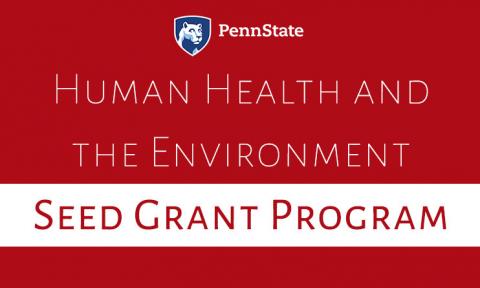
Human Health and the Environment seed grants for 2018 have been awarded to eight interdisciplinary teams of Penn State researchers. The seed grants were funded through a collaboration of Penn State Institutes and the College of Medicine, which collectively contributed more than $400,000.
The research teams and projects include:
—Molly Hall, College of Agricultural Sciences; Jennie Noll Professor, College of Health and Human Development; Andrew Patterson, College of Agricultural Sciences: “Leveraging metabolomics to identify environmental exposures and biomarkers associated with health disparities due to child maltreatment.”
—Nancy Luke, College of the Liberal Arts; Yubraj Acharya, College of Health and Human Development; Stephen A. Matthews, College of the Liberal Arts; Hongwei Xu, University of Michigan; Winsley Rose, Christian Medical College Vellore, Tamil Nadu, India: “Community-level Sanitation and Child Malnutrition Puzzles in Rural India.”
—Shimin Liu, College of Earth and Mineral Sciences; Siyang Zheng, College of Engineering; Zhiwen Liu, College of Engineering; Chandra Belani, College of Medicine; Lilin He, Oak Ridge National Laboratory: “Investigating the Effect of Nano-Coal-Dusts on Worker’s Health and Its implications on Pneumoconiosis and Lung Cancer.”
—Yingwei Mao, Eberly College of Science; Yongsoo Kim, College of Medicine; Steven Hicks, College of Medicine: “Environment-gene interaction in neurodevelopmental disorders.”
—Alicia McDonald and Ming Wang, College of Medicine; Jay Raman, College of Medicine; Guangqing Chi, College of Agricultural Sciences; Jeremy Gernand, College of Earth and Mineral Sciences: “Heavy Metal Exposures and Aggressive Prostate Cancer.”
—Bronwen Powell, College of Earth and Mineral Science; Alan Taylor, College of Earth and Mineral Science; Rebecca Bird, College of Liberal Arts; Isabella Cattadori, Eberly College of Science: “Complex social-ecological systems and nutrition in African Dry Forests: interactions between fire, landscape, climate, vector-borne disease and diet quality.”
—Asher Rosinger, Colleges of Health and Human Development and Liberal Arts; W. Larry Kenney, College of Health and Human Development; David Almeida, College of Health and Human Development; Kebin Hu, College of Medicine; Sera Young, Northwestern University “Water Insecurity, Stress, and Hydration (WISH): A cross-cultural exploration of psychological and biological consequences of water-related stressors.”
—Amanda M. Snyder, College of Medicine; Mark C. Stahl; College of Medicine; Xuemei Huang, College of Medicine; Gary H. Perdew, College of Agricultural Sciences; James R. Connor, College of Medicine: “The convergence of HFE genotype, pesticide exposure, and TBI on Parkinson’s disease pathology.”
—Nathaniel Warner, College of Engineering; Eric Chase Researcher, College of Engineering; Caitlin Grady, College of Engineering and College of Liberal Arts; Kathryn Braiser, College of Agricultural Sciences; Miriam Freedman, Eberly College of Science; William Burgos, College of Engineering; Frank Dorman, Eberly College of Science; Jack Vanden Heuvel, College of Agricultural Sciences; Robin Taylor Wilson, College of Medicine: “Health impacts of roadway dust and groundwater following treatment with oil and gas fluids.”
The overarching goal of the Human Health & Environment funding program is to build collaborations involving new interdisciplinary research teams whose research is aimed at attracting external funding. As is evident from the project titles, the research teams will conduct interdisciplinary research on a wide range of topics.
"The Human Health and the Environment Seed Grant Program provides funding for research teams to launch innovative projects aimed at solving some of the world’s most complex environmental health challenges,” said Susan McHale, director of the Social Science Research Institute and distinguished professor of human development and family studies. “These problems are unlikely to be solved by single disciplines and thus our program aims to develop diverse teams of experts from across the University."
The Clinical and Translational Science Institute, Huck Institutes of the Life Sciences, Institute for CyberScience, Institutes of Energy and the Environment, Materials Research Institute, Penn State Cancer Institute, Penn State College of Medicine, and the Social Science Research Institute collaboratively solicited research proposals.